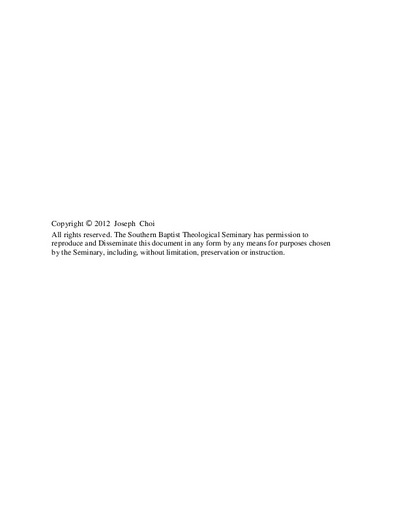Training Lay Leaders at Ebenezer Mission Baptist Church, Bayside, New York
Abstract
The purpose of this project was to educate, to equip, and to encourage the lay leaders of the Ebenezer Mission Church of Bayside, New York for them to teach and train the lay people in the church. Chapter 1 defines the context of the project, the purpose was three goals. It discusses this project's methodologies as they relates to training lay leaders.
Chapter 2 examines the biblical and theoretical perspectives of biblical leadership models and conventional leadership styles for training lay leaders: two biblical leadership models of Moses' and the apostle Paul's. And the selected conventional leadership styles are examined also: democratic leadership style; visionary leadership style; and coaching leadership style.
Chapter 3 discusses sociological and psychological perspectives of Korean first generation Christians in the United States. The Korean way of thinking has been influenced by Confucianism and the Korean religious way of thinking by Korean Shamanism respectively. Korean Christians in the United States have been affected consciously and unconsciously by post--modernism and religious pluralism which somewhat control their Christian religious lives.
Chapter 4 deals with items from chapters 2 and 3 in the fifteen sessions. The trainees involved so actively and diligently that they learned about the perspectives of biblical and conventional leadership styles and Korean way of thinking affected by Confucianism and Korean religious way of thinking rooted deeply in the Korean shamanism. Then the influences of post--modernism and religious pluralism on them were examined specifically. The trainees came to grasp psychological and sociological perspectives of Korean and necessary leadership skills.
Chapter 5 presents the evaluation by summary and conclusion of the project and further tasks. The purpose of this ministry project fulfilled through the post--test and the trainees were satisfied with the implementation through fifteen session. The developed lay leaders training program will expand to train the further ministry program including intercessory prayer program, and short--term mission and long--term mission. And in the future this lay leaders training program will be developed to cover the ministry and mission for the Korean second generation immigrants.

